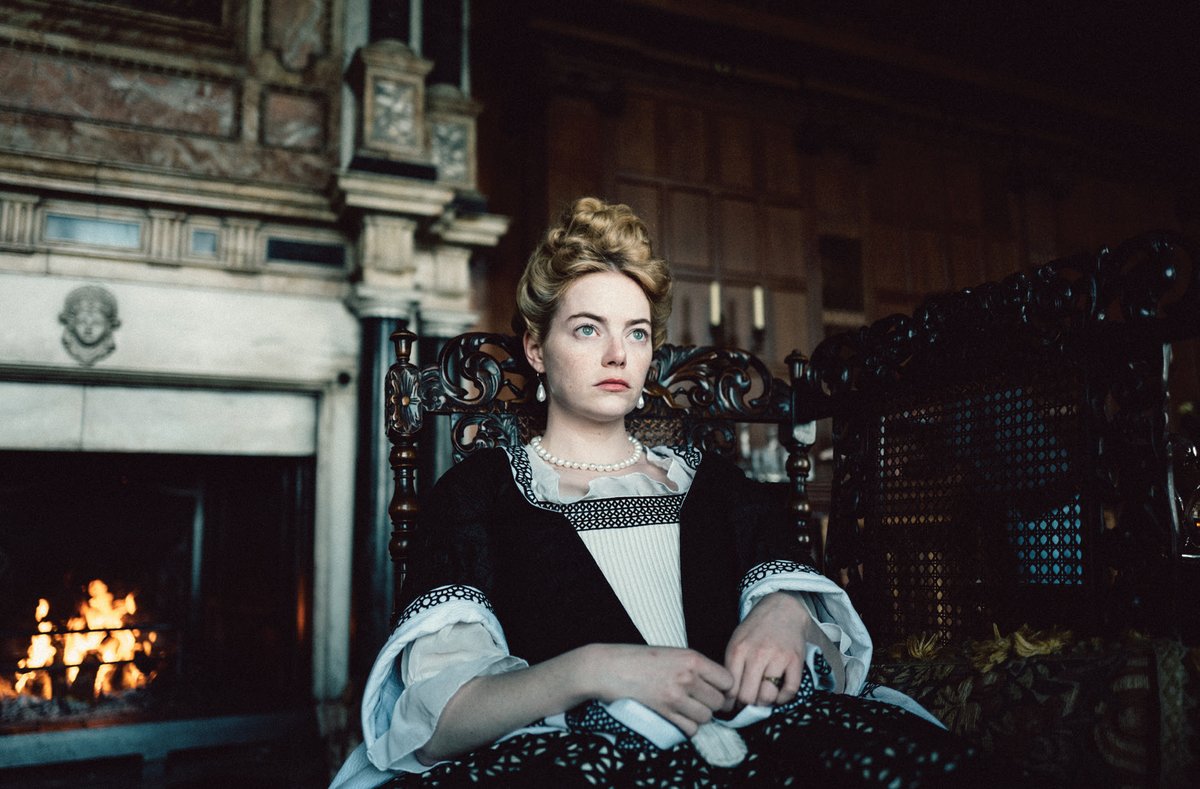Beneath layers of starched pleats and prim petticoats, the trio of well-stationed women who animate the ornate corridors of director Yorgos Lanthimos’ latest have claws. But this is no mere cat fight: the ladies of Queen Anne’s England are obliged to stay sharp in the scheming context that Lanthimos constructs, a well-bred past wherein the natural order exists solely to be upended again and again. Only the scrappiest (and those wielding the most caustic wit) survive.
At the center of The Favourite is the Queen herself (Olivia Colman), hobbled by gout and grief, but not yet so lame that she no longer serves as an attractive avenue for those who seek their own bit of power and influence in her court. Chief among these opportunists is Sarah Churchill (Rachel Weisz), the Duchess of Marlborough and the Queen’s friend from childhood, who attends to matters of state while Queen Anne (or Mrs. Morley, Sarah’s affectionate nickname for her) alternates between eating slabs of cake with her hands and upchucking in a silver vase. Allied with the parliamentary leader (James Smith) and married to a military commander (Mark Gatiss), Sarah jockeys to maintain her status as the Queen’s most trusted advisor and principle pet, as Weisz curates an impeccably icy aura. The cause of Sarah’s suddenly precarious position is her own cousin Abigail Hill (Emma Stone), a poor former noble from a family fallen from grace, who enters the story modest and covered in mud. Her arrival marks the beginning of a back-and-forth battle between the distant relatives for the Queen’s mercurial favour: Mean Girls transplanted to the wigs and manners of the 18th century.
The Favourite is very funny, a testament to both the film’s tightly written, R-rated script by Deborah Davis and Tony McNamara and the dry comedic talent of the actors who deliver it. Colman is garnering awards buzz for her sympathetic portrayal of the sloppy, woeful Anne, a queen who feigns a fainting when her proclamations are thrown into doubt and who mourns her lost children by tending to the seventeen rabbits she keeps by her bedside. It’s a performance devoid of all vanity, and Colman, already celebrated in her native Britain, deserves all the statues that might come her way this season. The only men that really matter in this film (Nicholas Hoult and Joe Alwyn) excel at the periphery, unreal as they may appear under a patina of white foundation and rouge. (“Your mascara is running,” quips Sarah to the leader of the opposition, a jab that functions as a dismissal and assertion of dominance.)
It’s hard to imagine an actress better suited for crafty underdog Abigail than Stone, who captivates audience empathy even as her character resorts to Machiavellian tactics upon her ascension to royal relevance. Stone’s impossibly expressive features register every blink of shock and purse of resolve, and it’s riveting to watch her gears turn as Abigail consolidates power by way of her own shrewdness. At times seductive and biting, at others diffident and loyal, Stone plays a character who is herself playing a character, all while eliciting the biggest belly laughs of my screening. “I’m on my side, always,” Abigail declares as she negotiates a deal that guarantees her place adjacent to the monarchy near the film’s close. With Stone inhabiting the role, so are we.
The Favourite shares something distinctly Lanthimosian with the other films in the Greek auteur’s oeuvre (Dogtooth, The Lobster, The Killing of a Sacred Deer), though exactly what those uniting traits are confound easy summary. It might have something to do with the meticulously minimalist depiction of the animal and the absurd, of a society trapped by foolish rituals. As if to mirror this claustrophobia, Lanthimos frames production designer Fiona Crombie’s tableaus in canted angles and disorientating wide shots filmed through anachronistic fisheye lenses, like we were peering into another realm.
Before she realizes the threat her new chambermaid poses, Sarah tells Abigail, “I have a thing for the weak.” The body is a fragile text in Lanthimos’ films, often maimed and mutilated in an exterior representation of dystopian ills. Still more delicate, though, are the tenuous bonds that tremble and break at the shifting winds of favour. As entertaining as it is to watch Sarah, Abigail, and the Queen lust and loathe after each other, it’s also, in small moments, quite sad. These are three women who, bound by tradition and their own stubborn humanity, can never truly have what they desire most. At least we get to see them bare their teeth as they try.




